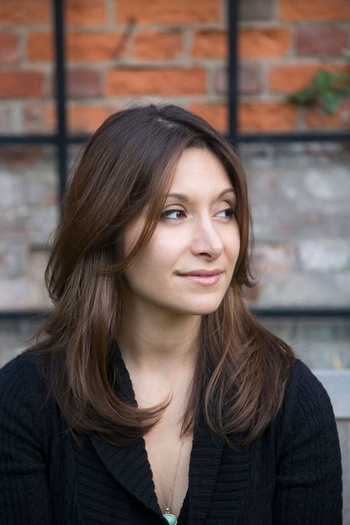In The Ungrateful Refugee, the Iranian-born American and French writer Dina Nayeri talks about her childhood in Iran, her escape from the regime, her journey via Dubai and Rome, and her never-ending refugee status. A wallop and an extended hand. As complex as it is human, as uncompromising as it is loving.
© Anna Leader
April 2017. Great Britain wants to leave the European Union, Donald Trump has been elected the 45th president of the United States, and within the walls of Fortress Europe, a horrifying representation of a crisis at the border is being propagated. The situation requires decisive action, but never fear, our leaders will “clean up” the mess.
In that same month, Dina Nayeri responded to those who govern by tweet with slightly more than 280 characters. Her viral essay “The ungrateful refugee: ‘We have no debt to repay’”, published in The Guardian, was the first time she rubbed salt in the pulsating wound of a society that is increasingly being torn apart. “It is the obligation of every person born in a safer room to open the door when someone in danger knocks,” she wrote. “It is your duty to answer us, even if we don’t give you sugary success stories. Even if the country gets overcrowded and you have to give up your luxuries, and we set up ugly little lives around the corner, marring your view.”
“There was this kernel of anger, this thing that I had bottled up for so long, that came out in that essay,” Dina Nayeri explains when we call her in Paris, where she is spending a year as a Fellow at Columbia University’s Institute for Ideas & Imagination. “I received a lot of hate mail after the essay, messages from trolls and people who had clearly only seen the title. But there were also some very kind emails, from people who said: ‘I didn’t realize that this was something that refugees struggled with. And I’m heartbroken that I might have contributed to this. Is there anything else that I don’t know?’ And I thought: ‘Oh my God, there is so much else!’ There’s so much shame that we have, and because of that a lot goes unsaid: during the escape, in waiting, when stuck in the camps, in the asylum-seeking process, and in assimilation… That’s why I wrote this book.”
My experience of leaving Iran and being a refugee was like a black hole, swallowing my entire universe
That book has just been published under the cursed title The Ungrateful Refugee. “Of course it was hard to take that terrible phrase and hold it up as a kind of flag. But anyone who has read my book, knows that I am profoundly grateful and that I carry this burden with me all the time. But I’m tired of having to posture that for the benefit of people who were lucky enough not to have spent their formative years in a refugee camp.”
A LIFE IN 230 QUESTIONS
“These are stories of uprooting and transformation without guarantees, of remaking the face and the body, those first murderous refugee steps,” as one razor-sharp line in The Ungrateful Refugee reads. Refugees are expected to be humble and grateful, and to wear that gratitude like a second skin. Even if it eradicates their own identity.
It is a feeling that Dina Nayeri herself knows all too well. As the daughter of a doctor and a dentist from Isfahan in Iran, she grew up in the 1980s, which were marked by a war with Iraq and a repressive Islamic regime. When her mother, who was born as a Muslim but converted to Christianity during a stay in England, was threatened by the regime, the mother, daughter, and son fled the country. Over a period of sixteen months, they travelled to the United States via Dubai and Rome. Ending up in Oklahoma, she made sure to study hard, she got into Princeton and Harvard, and steadily shook off her refugee identity. But she grew suspicious of what she had been doing all this time. “Going to college, falling in love, getting married and divorced, every single thing that I did in my life somehow instinctively I would relate back to that experience of leaving Iran and being a refugee,” Dina Nayeri says. “It was almost like this was a black hole, swallowing my entire universe. But if all of the stories of my life are being evaluated against this one, it is of the utmost importance how we tell those stories, how they are mangled, whose rules we use, and whose purposes they serve. And it’s important how you’re educated in the West to tell stories, because you decide what gets talked about and where we put our imagination.”

© Anna Leader
| Dina Nayeri
Refugees are often so broken that they beg to be recreated in the image of the original residents, Dina Nayeri writes in The Ungrateful Refugee. And then you are given over to the bureaucracy whose job it is to find that one mistake in a story that hangs by a thread of fear and tangible hope. But what about empathy and compassion? “How is it that a person is supposed to relearn how to tell a story within months? That’s near impossible.”
“When we’re young, stories are a comforting place, where you can interact with your imagination and memories in beautiful, liberating ways. But in an asylum office, all of a sudden, you’re in a situation where you have to mangle your story, make it fit into check boxes, and divide it up between 230 questions. To then never contradict yourself, make all of these grey areas that are part of anyone’s life black and white, I think is unnatural. There is something terribly violent in having lived through this experience – often a near-death experience –, having to uproot yourself, and then twist and contort your memories so that they can potentially move someone from a culture that you are utterly unfamiliar with.”
A FEARFUL CLOUD
“I understand that it’s hard to hold complexity in our hearts and minds,” Dina Nayeri adds, “and to understand that there are things that are hard to solve, that will take a lot of hands, and that will take a lot of thinking. It is difficult to know that we’ll be wrong many times, that we’ll be embarrassed in our efforts, and that we’ll be thwarted, but we’ll have to just accept that, because otherwise our human nature will simplify all of these beautiful stories and make them into this one fearful cloud. That way, we rob people of their dignity and their humanity.”
You can’t force love, gratitude, or assimilation. It is a natural, reciprocal process, we assimilate to each other. What you can expect from any human being is kindness, friendship, and cooperation in making a community
“People need to realize that we live in a world with borders, where resources are unfairly allocated, and where some people are dying. People need to think back to how they ended up in this position of extreme privilege. It is not right or just that you have the stability and the home that you have. So how can you possibly expect anything from this other person? You can’t force love, gratitude, or assimilation. It is a natural, reciprocal process, we assimilate to each other. What you can expect from any human being is kindness, friendship, and cooperation in making a community.”
Dina Nayeri puts her finger on the wound while at the same time applying the plaster that it needs to heal: through complexity, doubt, and wonderfully fluctuating stories. Through Dina Nayeri’s own history and the vicissitudes of other refugees whom she visited in camps in Greece or whom she spoke to while they were going through the Dutch asylum procedure. These are stories about the right kind of truth, the one little mistake, about self-doubt, entitlement, giant losses, little dramas in unlikely places… It is that fluidity that characterizes The Ungrateful Refugee. The fluidity of a skin on which you see the wrinkles of the past, the present, and the future, where the touch of the other leaves little scars, like a memory of the fact that we are going to have to find a way out of this together. “[Even] if your taxes rise,” as she put it in her essay “The ungrateful refugee”, “and your street begins to look and feel strange and everything smells like turmeric and tamarind paste, and your favourite shop is replaced by a halal butcher, your schoolyard chatter becoming ching-chongese and phlegmy ‘kh’s and ‘gh’s, and even if, after all that, we don’t spend the rest of our days in grateful ecstasy, atoning for our need.”
Read more about: Expo , Dina Nayeri , The Ungrateful Refugee , iran , literature




Fijn dat je wil reageren. Wie reageert, gaat akkoord met onze huisregels. Hoe reageren via Disqus? Een woordje uitleg.